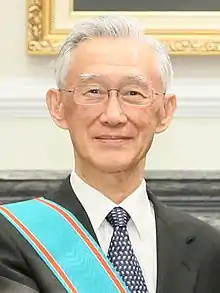Chen Li-an | |
|---|---|
陳履安 | |
 | |
| President of Control Yuan | |
| In office 1 February 1993 – 23 September 1995 | |
| Preceded by | Huang Tzuen-chiou |
| Succeeded by | Cheng Shuei-chih (acting) Wang Tso-jung |
| Minister of National Defense of the Republic of China | |
| In office 1 June 1991 – 26 February 1993 | |
| Preceded by | Hau Pei-tsun |
| Succeeded by | Sun Chen |
| Minister of Economic Affairs of the Republic of China | |
| In office 22 July 1988 – 1 June 1990 | |
| Preceded by | Lee Ta-hai |
| Succeeded by | Vincent Siew |
| Personal details | |
| Born | 22 June 1937 (age 86) Qingtian, Zhejiang |
| Nationality | Republic of China |
| Political party | Kuomintang |
| Spouse | Tsao Chin |
| Children | Chen Yu-hui |
| Parent |
|
| Education | Doctor of Philosophy |
| Alma mater | New York University |
Chen Li-an (Chinese: 陳履安; pinyin: Chén Lǚ'ān; born 22 June 1937 in Qingtian, Zhejiang, Republic of China), sometimes spelled Chen Lu-an, is an electrical engineer, mathematician and former Taiwanese politician. He was the President of the Control Yuan from 1993 to 1995.
While he still considered the Kuomintang a "rotten party", Chen endorsed the KMT candidate Lien Chan in the 2000 ROC presidential election, believing that Lien was unlike the rest of the Kuomintang.[1]
In January 2001, Chen re-joined the Kuomintang, because he thought both the party and Taiwan needed him.[2]
| 1996 Republic of China Presidential Election Result | ||||
|---|---|---|---|---|
| President Candidate | Vice President Candidate | Party | Votes | % |
| Lee Teng-hui | Lien Chan | 5,813,699 | 54.0 | |
| Peng Ming-min | Frank Hsieh | 2,274,586 | 21.1 | |
| Lin Yang-kang | Hau Pei-tsun | 1,603,790 | 14.9 | |
| Chen Li-an | Wang Ching-feng | 1,074,044 | 9.9 | |
| Invalid/blank votes | 117,160 | |||
| Total | 10,883,279 | 100 | ||
See also
References
- ↑ "Lien garners Chen Li-an's endorsement". Archived from the original on 14 January 2004. Retrieved 6 December 2003.
- ↑ Lin, Chieh-yu (4 January 2001). "KMT exodus could cost party its majority". Taipei Times. p. 3. Retrieved 29 January 2015.
This article is issued from Wikipedia. The text is licensed under Creative Commons - Attribution - Sharealike. Additional terms may apply for the media files.